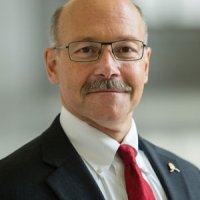Fleeing Change: Relocating the Village of Newtok, Alaska
The Village of Newtok, a Yupik Eskimo community of 450 residents, faces certain destruction from a slow-moving climate disaster. Coastal and river erosion of the Ninglick River embankment and degradation of the region's underlying permafrost have already destroyed critical infrastructure in the village, including the only barge landing, a solid waste site, and soon a freshwater source. Newtok may no longer be a viable community by 2020 and has been working to relocate to Mertarvik, a site nine miles upriver. Members of Newtok's leadership described their experiences and struggles to preserve their Yupik way of life on their historic subsistence lands.
Selected Quotes
Paul Charles (translated from the original Yupik):
“The relocation effort has not been very easy, especially the part related to trying to raise sufficient funds to make it happen… With climate change taking place and especially as it is impacting our community today, we are working very hard to make it happen.”
“There are certainly language limitations in the Stafford Act that have prevented FEMA from helping the tribal community, and there needs to be something done to address the fact that slow-moving disasters should be covered under the funding available.”
Albertina Charles (translated from the original Yupik):
“Within our community, the leadership from the tribal council and village corporation are both working hard in a hurry to try to help. We need all the help we can get. As an example, during the fall season, water levels went so high, they reached the community buildings and the permafrost that is melting underneath the water surface is rising to the top. As a result, leaks are forming and within those leaks it’s like sinkholes, where you cannot reach the bottom.”
“There’s a building in the community where there is water underneath entire foundation, and that water no longer freezes due to climate change. Regardless of any renovation efforts we have put into it and the work we have done, it somehow sinks into water and breaks away. There are homes in the community that have sunken so low, they have reached the ground level.”
George Carl (translated from the original Yupik):
“In the past, when I was younger, I was told about global warming events that might happen. Back then, I didn’t realize what they were talking about. But now, with what I see in my community today – there is very little snowfall, water no longer ices over, everything is melting – I recognize climate change. It’s really happening in our community.”
“Permafrost in the community has caused a lot of erosion due to warming of the weather. As the temperature rises, erosion is occurring fast. It’s not rain or other things or the wind; it’s really the temperature that triggers erosion activity. When it reaches 33 degrees and higher, that’s when we see an influx of land going into river.”
“It’s known that there were two elders in the past who selected the current site of Newtok. Back then, the land was high and solid… Those two elders have since passed… and over years the land has definitely changed. Now it’s now marshy and soggy and the land is much lower in elevation than it used to be.”
“In my younger years, where I stood in the community, I would look miles and miles away, but never see the river’s edge. Today, if you look out from my home, the edge is really just a few steps away.”
Romy Cadiente:
“In less than 20 steps, Newtok will lose the village’s [fresh] water source.”
“When it floods, the water gets into the residents’ homes and then it waterlogs the floor. Under the home, where it remains damp and cool, this becomes a perfect breeding ground for black mold – which is why Newtok has the highest incidence of influenza and respiratory ailments.”
“Equally troubling is the reality of relocation, or having your village labeled as a ‘non-sustainable community,’ where residents would have to abandon the place where they’ve lived for hundreds of years.”
“Ideally, if the stream of environmental impact statements and the language to support slow-moving disasters could be implemented, other villages whose banks are even closer than ours could avoid dislocation fears.”
“For sake of the residents in the communities who are scared and worried about what will happen to your community home when it falls into the ocean or river, we hope we have proven not to ever give up.”
Speakers
Moderator

US Ambassador-at-Large for Arctic Affairs; Former Chair, US Arctic Research Commission
Hosted By

Polar Institute
Since its inception in 2017, the Polar Institute has become a premier forum for discussion and policy analysis of Arctic and Antarctic issues, and is known in Washington, DC and elsewhere as the Arctic Public Square. The Institute holistically studies the central policy issues facing these regions—with an emphasis on Arctic governance, climate change, economic development, scientific research, security, and Indigenous communities—and communicates trusted analysis to policymakers and other stakeholders. Read more


Environmental Change and Security Program
The Environmental Change and Security Program (ECSP) explores the connections between environmental change, health, and population dynamics and their links to conflict, human insecurity, and foreign policy. Read more
